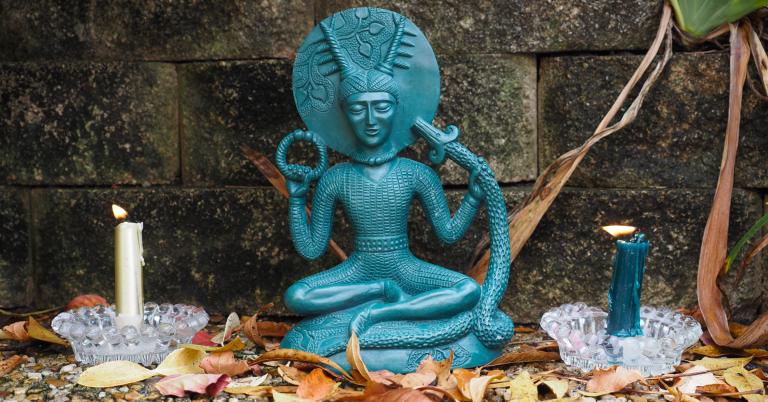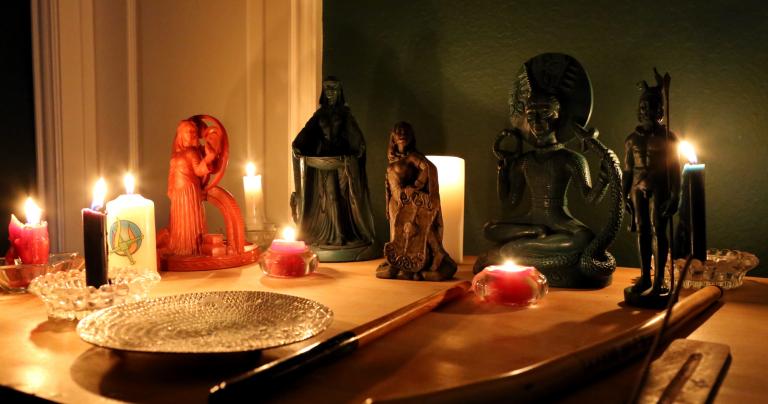Ever since the election I’ve felt the need to get back to basics, in my practice and in my blogging.
We need the basics to build a foundation for living virtuously and for exploring life in greater depth. It’s easy to think about the basics as boxes to be checked – we learn them and then we move on to something deeper and more important.
But just like physical foundations, our spiritual foundations need regular maintenance and reinforcement. Over the past month I’ve written five posts on the foundations of Paganism as I understand and practice it.
The Primacy of Spiritual Experiences
Paganism as a Religion of Relationships
Building an Orthopraxic Religion
The Role of Belief in an Orthopraxic Religion
Today I want to review the matter of the Gods. What do we know about Them, and how should we respond to Them?
1. We know there are Gods because we experience Them
This is where we begin. Not with a book, although the stories of our ancestors tell us something about how they experienced the Gods. And not with intellectual abstractions, although we can use logic and reason to learn some things about the Gods.
We know there are Gods because we experience Them. Sometimes these are subtle experiences. Other times they are loud and powerful. We can and should debate what these experiences mean, but for many people throughout the history of humanity, the best interpretation is that we have experienced the presence of a God.
2. Gods are spirits
We’re human, we classify things – it’s what we do. It’s an evolutionary adaptation that makes it possible for us to process massive sensory inputs quickly and efficiently, so we can stay alive long enough to pass our genes down to the next generation. Our classifications are often arbitrary and sometimes inaccurate, but over thousands of years some of them have proven to be consistently useful.
Trying to classify the Gods borders on impossible, but it’s what we do. And we can start here.
Some of the stories of our ancestors tell of Gods walking bodily among humans. Occasionally I hear someone talk about seeing a person they’re sure was a God. It is reasonable to believe that Gods occasionally take bodily form. But the vast majority of our contemporary experiences of Gods are of non-tangible persons – spirits.
3. Gods are persons
And that brings us to the next observation, that spirits are persons. And as such, they are individuals of inherent dignity and worth.
Some people say that all persons have spirits. I prefer to say that all spirits are persons – some persons have bodies and some don’t. You and I are persons. Your cat is a person. The tree in your back yard is a person. So are rivers and mountains. So are our ancestors.
All living beings are persons, and that includes the Gods.
4. Gods are the most of all persons
Our intuitive classifications lead us to put everyone in neat little boxes, but as useful as that practice is, it’s often inaccurate. What differentiates a God from an ancestor, the spirit of a place, or some other spiritual person?
I’ve heard it said (from Ian Corrigan, if I’m remembering correctly) that “Gods are the mightiest of spirits.” I got some resistance to that, because some people think it implies that might makes right. So instead, I’ve started saying that whatever other persons may be, Gods are the most. They are the oldest, the strongest, the wisest, the most virtuous – the most.
They are individuals – not every God is all of these things. A deified ancestor is not as old and likely isn’t as powerful as, say, Zeus.
I don’t know how to draw the line between “God” and “not-God” and I don’t think trying to draw it is particularly useful. Arguing about who is the “most of the most” is best left to teenage boys discussing comic book heroes.
But if spirits exist on a spectrum, Gods are the ones clustered at the far end.
5. Gods have areas of interest
We intuitively understand that the God of the Sun and the Goddess of the Moon have different areas of interest. The Gods of one people are more likely to be concerned with them than with people on the other side of the world (unless they choose to be concerned – the Gods call who They call). Different deities have different areas of interest, and perhaps, different responsibilities.
What this means is that while we can speak of “the Gods” as a cluster of beings and discuss what it means for a person to be a God, we cannot speak of “the will of the Gods” or “the mission of the Gods” with any meaning. They are individuals who sometimes work together, but each has Their own priorities.
Some Pagan and polytheist traditions teach that all the Gods are always in agreement. After reading the stories of our ancestors and the conflicts between various deities that they describe, I think that’s unlikely.
6. But we approach the Gods best through relationships, not through functions
Many people have said this before, but I’ll say it again: the Gods are not vending machines.
If you have a need, it is good and right to pray that your Gods will help you get it. But the emphasis here is your Gods – the Gods who you honor and serve on a regular basis.
Early on in my Pagan journey I called on a deity (who will remain nameless) because my need matched Their mythological function. I clearly heard “who are you and why should I give you anything?” I had no answer.
Just as you are more likely to go out of your way to help a relative or a neighbor (that you know and like) than a random stranger, so are the Gods more likely to assist someone who speaks to Them and listens for Them on a regular basis.
7. Our worship proclaims that the Gods are worthy
I wrote about this back in June. Worship is not about telling an insecure deity how they are everything and you are nothing. Worship is about proclaiming that the Gods are worthy. Our worship draws us closer to the Gods, it advances the Gods and makes Them more visible in the mainstream world, and mainly, it proclaims that Their virtues and values are how we should live.
Our society could use more divine virtues, both individually and collectively.
8. Worship is the beginning, not the end
The Gods have Their own interests and Their own areas of responsibilities – They have Their own lives.
So do we.
We do not exist to worship the Gods. We worship the Gods because it is good and right and helpful, because when we worship Them, we take on some of Their virtues. We become a little more God-like ourselves.
Now, what do we do with that?
We start by taking care of ourselves, our families, and our neighbors. We build respectful, reciprocal relationships with other persons, both human persons and other-than-human persons. We build a better world – a world that better reflects the virtues of the Gods.
We do this knowing that our efforts will be imperfect and that our lives are short. But we can build on the foundation left by our ancestors, and we can hand our work off to our descendants when we can no longer continue it.
When we do, over time our world becomes more God-like. And that’s a very good thing.
9. Many Gods, many people, many ways
These are my ideas about the Gods and how we relate to Them. I’ve written on this topic many times over the years.
Other people have other ideas. They worship and work with different Gods, they experience those Gods in different ways, and their Gods ask (or sometimes, demand) different things from them.
It has been so ever since humans first began spreading out across the world.
As curious as I am about the nature of Gods in general, I am far more interested in relating to the small handful of Gods who have made Themselves known to me. If other people have other experiences and other interpretations, that’s between them and Their Gods. All that concerns me is whether they treat others with dignity and respect, and that they conduct themselves in an honorable manner.
There are many different Gods. They call many different people to worship and work with Them in many different ways.
Listen for the God or Gods who call to you.
Pursue the God or Gods who appeal to you.
And support other Pagans and polytheists as they do the same.



















